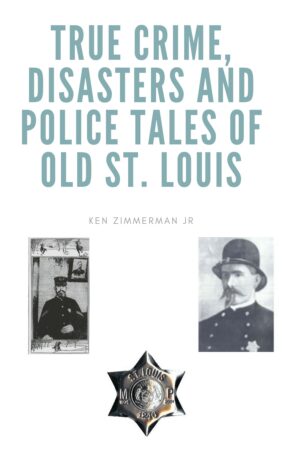Cracksmen Caught at Eugene Field House
Op Saterdag, Maart 12, 1904, St. Louis Detective James J. Moran led a team of detectives to a room in a row house at 634 South Broadway on St. Louis’ Near South Side. Frank Ward, a suspected safe cracker, rented a room in the row house. Besides Ward, the detectives arrested Edward Seely and John Shumway. Moran and the detectives suspected the three men of being “yeggmen” or safe crackers.
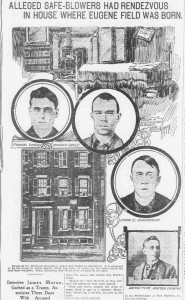
Safe Blowers Caught at Eugene Field House from March 13, 1904 uitgawe van St. Louis Republiek
The arrested men knew Detective Moran as “Kid” Moran, a local tramp and robber. Under his disguise, Moran successfully infiltrated the gang over three days. When Moran arrested the men, the St Louis Police Officers found enough nitroglycerin to blow up the Four Courts Building in Downtown St. Louis. Moran and his fellow detectives took the men to the same Four Courts Building, where St. Louis Chief of Detectives William Desmond and St. Louis Chief of Police Matthew Keely would “sweat” the safe burglars.
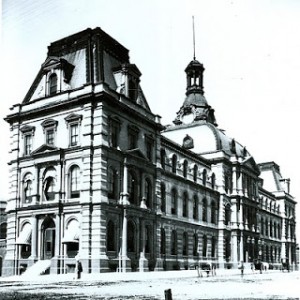
Four Courts Building – Late 19th and Early 20th Century home to St. Louis Courts and St. Louis Polisie
Chief Desmond accused the men of blowing open the safe of the Ruecking Construction Company on Tuesday, Maart 8, 1904. The burglars did not find any valuables in the safe on this job. Two nights later on Thursday, Maart 10, 1904, Ward and Seely blew open the safe at W. H. Warren Coke Company. The men reportedly made off with $20 in this burglary.
Chief Keely did not believe Shumway took part in the recent burglaries due to him having a broken leg. Keely interviewed Frank Ward’s wife of three months and her friend, who was caring for her during a recent illness. Ward’s wife did not know of his criminal past, when she married him at the end of 1903.
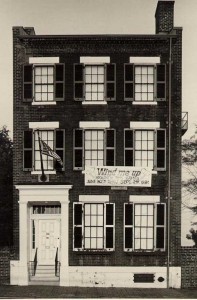
Eugene Field House in the 1980s during the historic survey
After speaking to the women, Keely interviewed Ward. When he accused Ward of being a safe blower, Ward betrayed himself by saying, “Nie; why, I couldn’t blow a ‘cracker box’.” Criminals at this time refered to easily broken into safes as “Cracker Boxes”. The general public did not use such a term.
Frank Ward and his wife rented a room at 634 South Broadway, which would eventually become the Eugene Field House and Toy Museum. Roswell Field owned the house in 1850, when his son Eugene Field was born. Roswell Field represented Dredd Scott in the famous anti-slavery case.
While a plaque on the building says Eugene Field was born there, it is believed he was born under medical care close by. Eugene Field did live at the house from 1850 te 1856, when his mother died. Roswell Field would send young Eugene to be raised by an aunt in Massachusettes. We will return to the house in a bit.
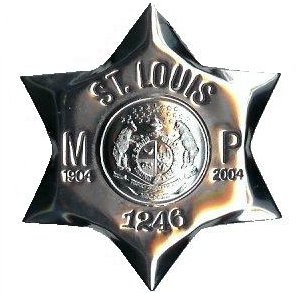
Vroeë St. Louis Polisie Badge van die openbare domein
Frank Ward initially denied his criminal record. When Chief Keely presented him with his record from the Bertillion System including his term in the Fort Madison, Iowa penetentiary for safe blowing, Ward confessed the record was correct. He continued to deny his role in the safe blowing.
Edward Seely also denied his involvement with the safe blowing. Seely claimed he lived in Cleveland, Ohio and his wife was staying at a hospital in Cincinnati. Mev. Ward said Mrs. Seely was staying in the Mullanphy Hospital in St. Louis.
Ward and Seely were hard cases of the first rank. When Detective Moran raided the Eugene Field House at 634 South Broadway, the superior force of 6 detectives ordered the men to throw up their hands. Ward and Seely attempted to retrieve their weapons from a dresser drawer but the cocked pistols of the detectives dissuaded them from their suicidal mission. St. Louis Police could have experienced another deadly police shooting like the Buurman op Pine Street.
Shumway also served time in the Illinois penitentiary for burglary. After some investigation, St. Louis Police determined Shumway to be Edward Alexander of Taylorville, Illinois.
The men wasted little time accepting their punishment. Op Maart 22, 1904, Ward, Seely and Alexander pled guilty to blowing safes. Judge Taylor sentenced all three men to two years in the Missouri Penitentiary.
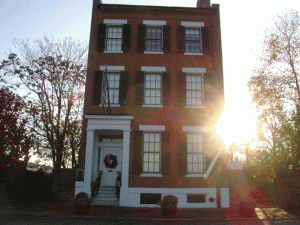
Eugene Field House as It Looks Today – Vergunning van Geo St. Louis
The Eugene Field House was one of several row houses in the 600 block of South Broadway in 1904. Gebou in 1845, the former home of Roswell and his poet son Eugene Field deteriorated between the time of this case and 1936. Walsh’s Row was a place of affluence in the mid-Nineteenth Century but it faded over the years as the wealthy continued moving westward.
Faced with potential demolition in 1936, the Eugene Field House Foundation formed to protect the property. Vandag, it is the only row house left on the block. It is a historic monument and toy museum.
Detective James Moran would rise to the rank of Captain of St. Louis Police before retiring. Moran would make many important arrests but few probably had the historic connection that his arrest of the cracksmen did.
You can leave a comment or ask a question about this or any post on my Facebook bladsy.
Pin It
